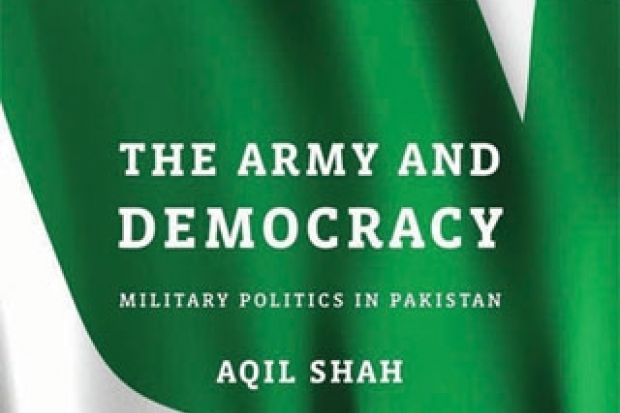In the mid-1980s, while Pakistan laboured under yet another military dictatorship, the illustrious civil rights lawyer Aitzaz Ahsan deplored what he called his country’s “bonsai democracy”. Like a highly cultivated plant without deep roots or wide branches, it served as mere window-dressing to please Pakistan’s Western sponsors. While this description has rarely been matched, there is no dearth of analyses aiming to pinpoint the causes of Pakistan’s stunted democracy. Opinion, however, is sharply divided. For some the fault clearly lies with the elected politicians whose chronic divisions have fatally undermined the prospects of democratic consolidation. Others blame a politicised military for flouting the constitution and deliberately weakening civilian rule with the aim of enhancing its own power.
Joining the fray is US-based Pakistani scholar Aqil Shah, whose rich and skilfully argued book leaves no doubt about the military’s central responsibility in blighting the course of Pakistan’s democratisation. While some may see his approach as too forgiving of Pakistan’s politicians, his is a fresh and original perspective that demands serious consideration. Breaking with the conventional view of the military as a force prompted to intervene politically to secure its institutional interests, Shah argues (largely persuasively) that it is primarily deference to institutional norms that has conditioned the military’s responses to external and internal pressures.
It is these shared “traditions of tutelage” forged in the context of Pakistan’s geopolitical insecurity – namely the threat from India – and the country’s lack of national cohesion, he claims, that are largely to account for the military’s elevated and profoundly misplaced notions of “guardianship”. Together they have contributed not only to the military’s distrust of politicians as less able to guarantee national security but also, more damagingly for democracy, to the military’s “belief in the appropriateness of extra-constitutional change” to protect the “national interest” – a notion defined exclusively in line with its own interpretation. At the heart of this “military mentality” is the assumption that the military alone stands between anarchy and order: any weakening in its structure would “spell the end of Pakistan”.
Shah rightly gives such hyperbole short shrift. Instead, with his finely tuned analysis of the military’s declassified records, his searching exploration of the military’s socialisation programme and his deconstruction of the pronouncements of successive military regimes, he offers insights that point conclusively to the strength of his thesis.
Nevertheless, there remains the small matter of convincing some, at least, of his readers that what passes for the military’s normative framework is no more than an attempt to rationalise its hard-nosed interests. Recent ground-breaking work on Pakistan’s military suggests that, like those elsewhere in Asia, it has developed significant stakes in the economy that act as powerful incentives for the military’s repeated intervention in politics well beyond any perceived adherence to institutional norms. New work also testifies to the influence of more diverse centres of power in Pakistan, such as the judiciary and the media, which now harbour ambitions to “guard the guardians”. Although still vulnerable to the threat of military coercion, they are arguably better placed today than at any time in the past to challenge the military’s hubristic, self-serving tutelary beliefs.
The Army and Democracy: Military Politics in Pakistan
By Aqil Shah
Harvard University Press, 416pp, £25.95
ISBN 9780674728936 and 4419766 (e-book)
Published 24 April 2014
Register to continue
Why register?
- Registration is free and only takes a moment
- Once registered, you can read 3 articles a month
- Sign up for our newsletter
Subscribe
Or subscribe for unlimited access to:
- Unlimited access to news, views, insights & reviews
- Digital editions
- Digital access to THE’s university and college rankings analysis
Already registered or a current subscriber?





